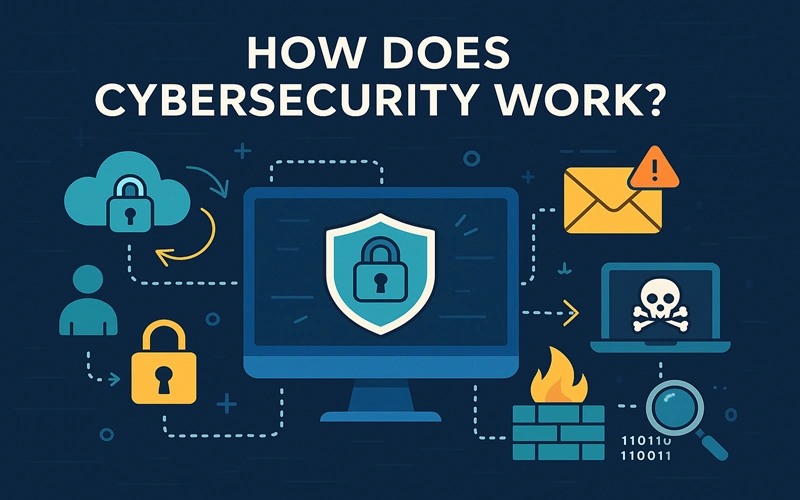In our modern world, we use the internet for everything—from chatting with How Does Cybersecurity Work friends, shopping online, playing games, to doing school or work. But just like we lock our doors at night to stay safe at home, we also need protection when we go online. That’s where cybersecurity comes in.
What Is Cybersecurity?
Cybersecurity is the way we protect computers, phones, tablets, and networks from bad guys on the internet. These bad guys are often called hackers or cybercriminals. They try to steal personal information, break into computer systems, or mess up how things work.
Imagine your computer or phone is a house. How Does Cybersecurity Work You wouldn’t leave your door open, right? You’d lock it, maybe set up an alarm, and be careful who you let in. Cybersecurity works in a similar way for your digital house—your devices and your data.
Read More: money6x .com
Why Is Cybersecurity Important?
The internet is full of useful stuff, but also risks. Without protection, someone could:
-
Steal your passwords
-
Read your private messages
-
Use your credit card without permission
-
Infect your computer with viruses
-
Even lock your files and ask for money to get them back
That’s why learning how does cybersecurity work is so important. It helps us understand how we can stop these threats and stay safe online.
The Main Parts of Cybersecurity
Cybersecurity isn’t just one thing—it’s a group of tools, rules, and smart habits that all work together. Let’s look at the most important parts:
1. Firewalls
A firewall is like a security guard for your device. It watches the data coming in and going out. If it sees anything suspicious, it blocks it.
Think of a firewall like a filter that keeps the bad stuff out, kind of like a bouncer at a party who only lets invited guests in.
2. Antivirus Software
Antivirus software scans your computer for harmful programs called viruses or malware. These are like germs for computers. If it finds something dangerous, it will try to remove it or put it in quarantine.
This is like having a doctor on your computer who checks for illness and helps your system stay healthy.
3. Encryption
Encryption is a fancy word for scrambling information so no one else can read it. When you send a message or enter a password, encryption makes sure only the right person sees it.
Imagine writing a secret note in code so only your best friend who knows the secret code can read it. That’s what encryption does online.
4. Passwords and Authentication
A strong password is your first line of defense. It’s like a key to your online house. The more complex and secret it is, the better.
Some websites also use two-step verification. That means even if someone guesses your password, they still need a special code sent to your phone or email to get in. It’s like needing two keys instead of one.
5. Updates and Patches
Hackers are always finding new ways to break into systems. That’s why software updates are so important. When you update your phone or apps, you’re closing holes that hackers might try to crawl through.
In cybersecurity, this is called patching. Think of it as fixing cracks in the walls before the rain comes.
How Does Cybersecurity Work Behind the Scenes?
Now that we’ve looked at the tools, let’s see how they all work together like a team.
When you visit a website, your computer sends and receives data. Cybersecurity systems like firewalls and antivirus scan the data. They check if the website is real or fake, if any harmful files are trying to sneak in, and if your information is being protected.
If something suspicious is found, the system may block the connection, send an alert, or fix the problem. In companies, cybersecurity teams even have people working 24/7 to monitor systems and respond to threats in real time.
So, how does cybersecurity work? It’s like a combination of smart tools, helpful rules, and constant watching to make sure nothing dangerous gets through.
Types of Cyber Threats to Watch Out For
Understanding threats helps us be better prepared. Here are some of the most common cyber dangers:
-
Phishing: Fake emails or messages that try to trick you into giving personal information.
-
Viruses and Malware: Programs that damage your files or steal your data.
-
Ransomware: A type of malware that locks your files and asks for money to unlock them.
-
Spyware: Secret software that watches what you do online.
-
Hackers: People who try to break into your computer or accounts.
Cybersecurity works to stop all of these and more.
How Can You Protect Yourself?
Even if you’re not a tech expert, there are simple things you can do to stay safe online:
-
Use strong passwords (mix of letters, numbers, and symbols)
-
Don’t click links in suspicious emails or messages
-
Keep your software and apps updated
-
Use antivirus software and turn on your firewall
-
Don’t share personal information on public Wi-Fi
-
Always log out of your accounts when done
Learning how does cybersecurity work helps you understand why these steps matter.
How Big Companies Use Cybersecurity
Big companies like banks, hospitals, and schools have huge amounts of private data. They use powerful cybersecurity systems to protect it.
They have:
-
Security teams watching for attacks
-
Special software that detects threats
-
Backup systems in case of a cyberattack
-
Employee training so people don’t fall for scams
Even with strong protection, cyberattacks still happen. That’s why cybersecurity is always changing and improving to stay ahead of the bad guys.
How Cybersecurity is Evolving
As technology changes, so do the ways we protect it. Today, cybersecurity uses things like:
-
Artificial Intelligence (AI): Smart programs that learn to detect new threats.
-
Cloud Security: Protecting data that’s stored online instead of on your computer.
-
Blockchain: A technology that adds extra layers of trust and transparency.
-
Zero Trust Models: A rule that says never trust, always verify—no one gets in unless they prove who they are every time.
So, when someone asks, how does cybersecurity work, the answer is: it keeps growing smarter every day!
Careers in Cybersecurity
If you love computers and want to help people, cybersecurity can be a great job. Some roles include:
-
Security Analyst: Watches for threats and stops them.
-
Ethical Hacker: Tries to break into systems to find weaknesses (but legally!).
-
Network Security Engineer: Builds safe systems for computers to talk to each other.
-
Forensic Expert: Investigates cybercrimes and finds clues after an attack.
Cybersecurity professionals are like digital heroes working in the background.
Final Thought
So, how does cybersecurity work? It’s a powerful mix of tools, people, and smart practices that protect our digital world. From firewalls to passwords, from antivirus to encryption, everything works together like a digital security system.
Whether you’re a kid learning to use a tablet, a student doing schoolwork online, or a parent shopping on the internet—cybersecurity helps keep your data safe.
The next time you get a software update, see a password prompt, or install antivirus, remember—it’s all part of the answer to the question: how does cybersecurity work?
Frequently Asked Questions (FAQs)
1. What are the basic tools used in cybersecurity?
Cybersecurity uses tools like firewalls, antivirus software, encryption, and multi-factor authentication to keep your devices and data safe.
2. Can I protect myself online without knowing a lot about technology?
Yes! Simple habits like using strong passwords, updating your software, and avoiding suspicious links can go a long way in staying safe.
3. How does cybersecurity work in schools or companies?
In schools and companies, cybersecurity involves security teams, monitoring tools, rules for safe internet use, and training people to recognize threats.
Read More: chelsea acton famousparenting

